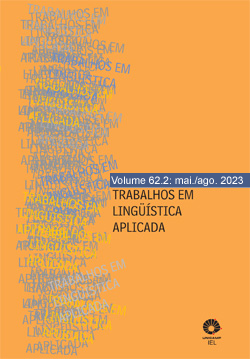Abstract
Queer Theory emerged at the turn of the millennium (BOONE, 2000) and has developed in recent decades along with the affective turn in the humanities and social sciences (CLOUGH, 2007). Also influenced by the same turn, Translation Studies began to become increasingly interested in issues related to affectivity and, among these issues, we observed the development of Queer Translation Studies, addressed by Brian James Baer in the book entitled Queer Theory and Translation Studies: language, politics, desire.
Some theorists of Translation Studies, such as Hermans (2006), already showed a lot of interest in analyzing the translation of the "other". However, the concept of "other" encompassed only different cultures and nationalities, until then without considering identities that escape sexual and gender normativity. Baer and Kaindl (2017), however, assert that Translation Studies and Queer Theory blend together, as Queer Theory reflects on the representation of the "other," while translation makes it possible for the "other" to be brought to light.
According to Baldo (2018) and Baker (2013), affectivity is more noticeable in politically engaged texts, such as LGBTQIAP+ translations. The act of translating and publishing a queer text, by itself, can be a form of resistance to a prejudiced society. In addition, the translator who is part of the LGBTQIAP+ community is affectively connected to the content of queer texts and, in repressed societies, translation can be a way to produce queer literature without the risk of revealing itself outside of heteronormativity (LEWIS, 2010). Considering the evident relationship between the affective turn and the development of Queer Translation Studies, I believe that the present dossier would have to gain from a review of this unpublished work by Brian James Baer (2021), Professor of Translation Studies at Kent State University and founding editor of the journal Translation and Interpreting Studies.
References
CASTRO, Olga. (2017) (Re)examinando horizontes nos estudos feministas de tradução: em direção a uma terceira onda?. Tradução: Beatriz Barbosa. TradTerm, vol. 29, n. julho, p. 216-250.
HARVEY, Keith. (2000) Gay Community, Gay Identity and the Translated Text. TTR: Traduction, Terminologie, Rédaction, v. 13, n. 1, , p. 137-165.
SNELL-HORNBY, Mary. (2006) The Turns of Translation Studies: New Paradigms or shifting viewpoints? Amsterdam/Philadelphia: John Benjamins Publishing Company.
TYMOCZKO, Maria. (2000) Translation and Political Engagement: Activism, Social Change and the Role of Translation in Geopolitical Shifts. The Translator, v. 6, n. 1, p. 23-47.
von FLOTOW, Luise. (2013) Traduzindo Mulheres: de histórias e re-traduções recentes à tradução ‘Queerizante. Tradução: Tatiana Nascimento dos Santos. In: BLUME, Rosvita; PETERLE, Patricia (eds). Tradução e Relações de Poder. Tubarão: Copiart, p. 169-172.
WOLF, Michaela. (2013) A “vontade de poder”: tradução no campo de tensão entre poder e ética. Tradução: Rosvitha Friesen Blume. In: BLUME, Rosvitha.; PETERLE, Patricia. (Orgs.) Tradução e relações de poder. Florianópolis: PGET/UFSC, p. 149-168.

This work is licensed under a Creative Commons Attribution 4.0 International License.
Copyright (c) 2023 Thayna Pinheiro Ferreira (Resenhista)


